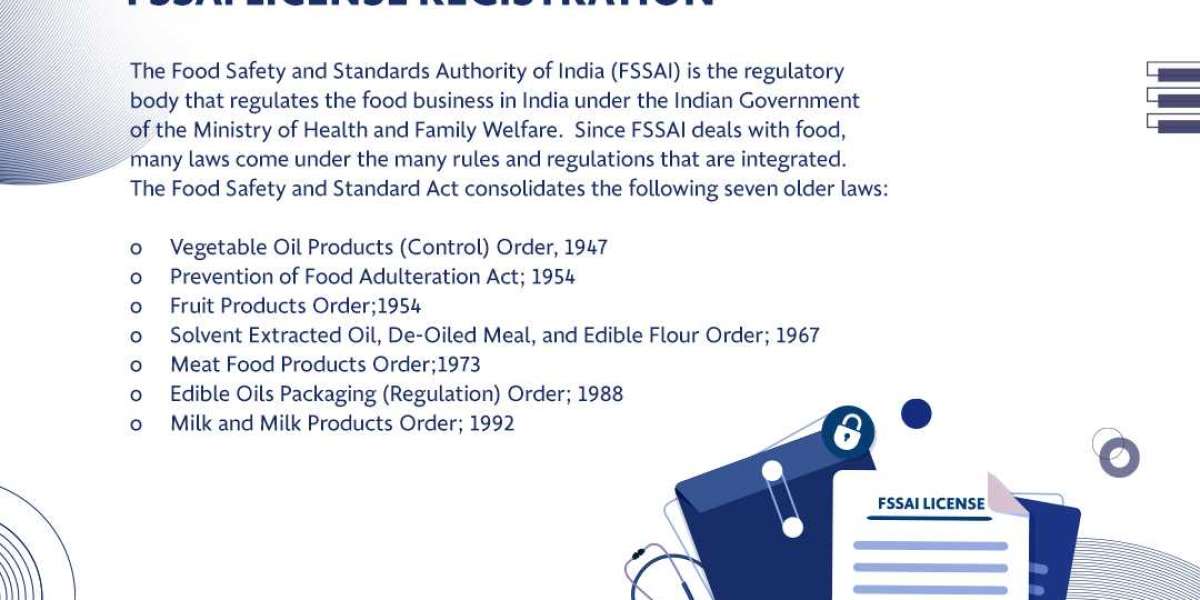The Food Safety and Standards Authority of India (FSSAI) is the regulatory body that regulates the food business in India under the Indian Government of the Ministry of Health and Family Welfare. As per the Food Safety and Standards Act, FSSAI was established in 2006. The main aim of FSSAI is to regulate the business that handles food, such as storage, production, transportation, etc., to ensure food is handled safely and carefully. Since FSSAI deals with food, many laws come under the many rules and regulations that are integrated. The Food Safety and Standard Act consolidates the following seven older laws:
- Vegetable Oil Products (Control) Order, 1947
- Prevention of Food Adulteration Act; 1954
- Fruit Products Order;1954
- Solvent Extracted Oil, De-Oiled Meal, and Edible Flour Order; 1967
- Meat Food Products Order;1973
- Edible Oils Packaging (Regulation) Order; 1988
- Milk and Milk Products Order; 1992

The main aim of the FSSAI is to monitor hygiene, quality, and safety and establish the rules which are needed to be followed by food business owners. FSSAI also gives license registration to different food business owners, which puts the responsibility of self-compliance to the FSSAI rules, regulations, and acts, on the food business operator. There are three different FSSAI licenses:
- a) Registration (or the Basic license)
- b) State license
- c) Central license
To obtain these licenses, the food business owners must submit applications along with required documents to the FSSAI.
BLOG CONTENT
Documents required for different FSSAI licenses:
When a food business owner decides to go for an FSSAI license, first, they need to understand in which category their business will fall and then apply for a license accordingly. Different licenses require different documents, which FBO must fulfil to obtain their business licenses.
The following documents are required for FSSAI Registration:
- Photo
- Government issued Photo ID such as AADHAAR, PAN, Voter ID etc.
- Proof of Address of Businesses activity (if address is other than as mentioned in Photo ID Card)
The following documents are required for FSSAI State license and Central license:
- Photo ID and address proof of business owner/director/authorized signatory
- Constitution certificate of business such as partnership deed, incorporation certificate, establishments license of the shop, etc.
- Possession proof of business facility such as an agreement of rent, utility bills, etc.
- Plan of food safety management system
- List of food products that would be manufactured/processed/stored/distributed.
- NOC by municipality or panchayat, health NOC called supporting documents (if required).
- Statement of ingredients and additives for each product in case of supplements or proprietary food.
- Processing unit plan consisting of area and dimension along with area-wise allocation.
- A complete list of Directors/Partners’ names, addresses, contact details, and photo IDs.
- List of equipment and machinery used along with the name, number, and capacity.
- Letter of the authority of the nominated responsible person from the manufacturer.
- Water analysis report.
- Source of raw material for milk, meat, etc.
- Recall plan (if applicable)
- 100% export orientation unit form from the ministry of commerce.
- NOC from FSSAI, if applicable
- Code document of IE from DGFT
- Form IX
- Turnover supporting document
- Case specific documents as applicable to the importer/manufacturer/distributor etc. depending upon the kind of business.
Steps to obtain the FSSAI license:
Step 1: Fill out Form A (Registration) or Form B (State or central license) as per the requirement on the FoSCoS portal.
Step 2: When filling out the form, upload the mandatory documents to the portal.
Step 3: FSSAI scrutinizes the application.
Step 4: If necessary, the FSSAI can conduct the audit.
STEP 5: If the FSSAI is satisfied with the food business owner application and documents submitted, then they grant the license. Else, a query is raised by FSSAI seeking clarification or other supporting documents.
STEP 6: Applicant can download the certificate from the portal and comply with the conditions of the license.
STEP 7: The business owner must display the license at the business during business hours.
Obtaining an FSSAI license is a necessity as it is the proof that food business complies with the acts, rules, and regulations of the FSSAI and that the products are safe to consume. Not only safety but having an FSSAI license increases the brand value and trust among the customers as people believe that businesses easily who follow the norms and regulations set by the government.
Conclusion: Before starting a food business, it is necessary to gain information on the type of license one needs and the documents one needs to submit. Most of the rejected applications are due to the applicant needing clarification about their category or not submitting all the required documents. Thus, it is advisable for food business owners to must have the checklist of the documents needed for the FSSAI to obtain the license if they want to receive the registration in time. If the food business owner fails to obtain the license at the time of business, they have to face the penalty and fines, which not only cause financial loss but also harm the brand image in the market.








